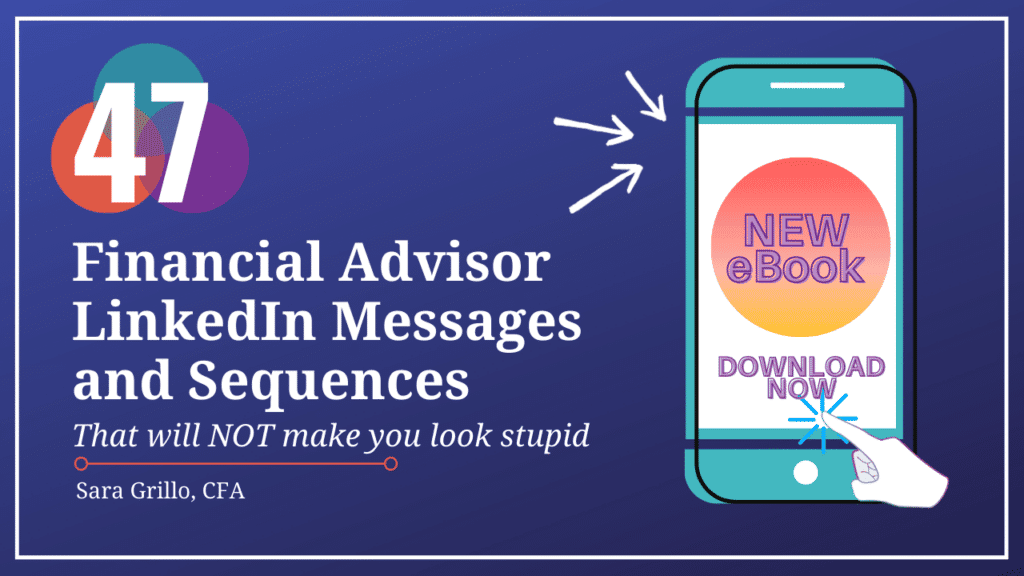Podcast: Play in new window | Download
It seems like there ain’t nothing more tread upon and abused than the fiduciary standard. So we’ve got a lively crew here today to debate, does it really matter if someone is a fiduciary financial advisor, or not? Is it, “meh, who cares”, or does it make a true difference? Let’s debate it!
For those of you who are new to my blog, my name is Sara. I am a CFA® charterholder and financial advisor marketing consultant. I have a newsletter in which I talk about financial advisor lead generation topics which is best described as “fun and irreverent.”

Why is the fiduciary standard important in financial advice?
The fiduciary standard is important because it defined parameters for behaviors impacting the way that financial advisors treat their clients. It impacts our reputation (and right now, we have a bad one) as industry and in a broader sense it influences the civility of society.
The standard, however, is often used haphazardly, invoked as a sales tool by dual-registered advisors who want to virtue signal, only to be abandoned in a legal context by those same advisors who backpedal into being “just a salesperson.”
Let’s talk about it.
In this debate we’ll tackle these questions and more:
- What is a fiduciary financial advisor?
- Does it matter if you are a fiduciary or not?
- Does conflict of interest matter?
And here’s the debate crew:
- Kelly Nilsson, advice only planner at Brava Financial, approved David clause
- Scott Jacobs, advisor at EP Wealth,
- Jay Adivaraha, PhD, independent life insurance professional
- Knut Rostad, President, Institute for the Fiduciary Standard,
- Steven Lee, lecturer at Cal State Polytech University
- Scott Salaske, my homeboy in the LinkedIn streets and CEO of FirstMetric
What is a fiduciary financial advisor?
Kelly Nilsson summed up how to define the fiduciary standard for financial advisors brilliantly.
A fiduciary financial advisor is person who has an undivided loyalty to the person they are serving. Someone who has a conflict of interest can not operate as a fiduciary. A fiduciary provides advice and counsel that is solely in the best interest of the client.
-Kelly Nilsson
According to Knut Rostad, a fiduciary financial advisor gives advice that is truly in the best interests of the client or beneficiary because it is based upon competence and loyalty, not bias or sales goals.
The word “fiduciary” is not a marketing term, not just something you throw out there to virtue signal. It’s about how you behave and the operational standards you follow.
- Researching costs of investments, services, and products rendered to the client
- Assessing if risk is reasonable for the client
- Assessing if performance expectations are reasonable for the client
But these are all loose definitions. What does the law actually say about the fiduciary standard?
Legal definition of the fiduciary standard
To quote directly from a paper by Attorney Lorna Schnase, two bodies of law form the legal basis for the fiduciary standard:
Common law: Under common law principles of agency, an investment adviser, as agent, owes fiduciary duties to its client, as principal.3 Certain other aspects of an adviser’s fiduciary duties are grounded in the law of trusts.4 In any event, an adviser’s duties at common law will depend on judge-made case law emanating from the state level, including application of conflicts of law principles to determine which state’s law applies, and will be enforceable by anyone with standing to sue.
-Attorney Lorna Schnase, An Investment Adviser’s Fiduciary Duty
Federal statutory law: Section 206. An adviser’s fiduciary duty also emanates from certain federal statutes, most notably Section 206 of the Investment Advisers Act of 1940 (“Advisers Act”), an anti-fraud section which generally prohibits an adviser from engaging in any practice that is fraudulent, deceptive or manipulative…
As a result, the Advisers Act is viewed as setting a “federal” fiduciary standard for advisers. Because there is generally no private right of action under the Advisers Act, the contours of that duty will be shaped largely by federal courts interpreting the Act, as well as by SEC interpretations of Section 206 and rules promulgated under that section.
But…can you be a fiduciary solely by how you act???
If we are going to assign fiduciary status by conduct, things get confusing and this confusion does not benefit the public. Individuals may certainly conduct themselves in accordance with the fiduciary principles, so they say, and they feel it then awards them the right to call themselves fiduciaries.
But if they are acting in the capacity of a broker or agent then they are not bound to follow the fiduciary standard. They may still follow it, but they are not bound. If their sole method of compensation is a product, and/or they are taking commissions, then in reality it is less likely they are embracing all the values that the standard requires. This is where the confusion comes in. There is such a tremendous misappropriation of the word for marketing purposes, and here is the issue is creates.
According to the Consumer Federation of America,
When they are marketing their services to the investing public and enticing clients into handing over their hard-earned savings, these sales-based financial professionals present themselves as “trusted advisors” whose only concern is their clients’ best interest. But try to hold them legally accountable for meeting that standard, and those same “advisors” quickly change their tune. Because they are salespeople who are “merely selling” investment products, they claim, no fiduciary standard ought to apply.
-Consumer Federation of America
The ambiguity and the lack of clarity is detrimental. It’s confusing to the client and unfortunately that confusion is waged onto them on purpose.
The broker-dealer and insurance industries are still built around being opaque. Commissions are opaque. Insurance is opaque. The fiduciary standard is about transparency.
Clients needs to know what kind of bias is acting upon the services they are getting. It should be presented in complete and with total clarity in a plain language way that they can understand. That way, they can judge for themselves who they should work with, and in what capacity that person should operate, to result in the best possible outcome.
Does not being a fiduciary financial advisor make you a bad advisor?
It is a small percentage, less than 10%, of financial advisors who follow the fiduciary standard 100% of the time – the “pure fiduciaries.”
Does that mean all the rest are bad advisors?
Not necessarily.
Not being a fiduciary financial advisor doesn’t mean you aren’t a good advisor. For example, there is nothing that says that an insurance agent’s recommendations can’t be made in the best interests of clients. But they are still not fiduciaries even if their recommendations are in the client’s best interest.
There are good and bad advisors in each category, fiduciary and non-fiduciary.
For example, according to Dr. Adivahara, fiduciaries aren’t necessarily the most competent in all scenarios. For example, when it comes to insurance, he sys that many of the fiduciary financial advisors he talks to do not understand the mechanics of insurance. Even though somebody is a fiduciary, it doesn’t mean they are necessarily competent in the specific area where a client needs help.
Does the fiduciary standard matter?
It’s not just about doing a “good job.” To say “I do a good job”, according to Scott Jacobs, is also like saying, “What I do is suitable” and that is a mediocre standard of care. This is a highly subjective way of looking at how a financial advisor serves their clients and it opens the door to all sorts of manipulation.
Scott Jacobs cites instances of encountering prospects who say things like, “I bought an annuity but I didn’t pay anything for it”, or they own an annuity and they have no knowledge of why it was sold to them. He says that he doesn’t generally bring in relationships from other RIAs. Usually they are coming from the broker dealers where clients got fed up with expense ratios of 1, 2 or more percent. How do you justify the client spending an extra $10,000 in expenses? RIAs do not generally operate that way; it is usually the broker dealer model. He thinks that doing what is in the best interest of the client is an afterthought in the broker dealer world.
The entire economy, the world of investing, is based upon being able to trust who we are listening to. If that is absent, we have a big problem. There must be standards and categories, because without them there is no objective basis for comparison and judgement.
Does conflict of interest matter?
We’ve been throwing this term around a bit, so let’s define it. What is a conflict of interest in financial advice?
When there is a bias present in the financial advisor’s practice that would urge the advisor to make a recommendation that is not completely in the client’s best interest, it is considered a conflict of interest. Anything that compromises the financial advisor’s judgement is as such.
Conflicts of interest can not be completely eliminated from financial advice. To varying extents, there are always conflicts on some level. Some are major and some are minor. Some are inconsequential and others have large consequences for the client and work in the advisor’s favor instead of the client.
Does disclosure of conflict of interest in financial advice matter?
Advisors have a variety of ways to work with clients and they can essentially choose the conflicts that their clients are subject to. Each way of working with a client – advice only, flat fee, AUM, commission broker, insurance agent – has some type of conflict of interest attached to it. How large the extent of the conflict matters, as well as how it is managed and disclosed.
If an AUM advisor is managing a $5MM account, and a client comes in and says, “I’m taking half of this to buy a commercial property”, the AUM advisor is essentially taking a 50% pay cut. And they are supposed to advise in your best interest? Very few advisors would be able to overcome the bias to try to encourage the client to keep the money under their management. Very few would be able to render completely objective advice in the face of a 50% reduction in pay from that relationship.
Disclosing conflict of interest doesn’t get rid of it, but it does help to foster discussions that make us more aware. If there is true and complete transparency, the client knows what they paid in total all-in costs last year, and all conflicts of interest are disclosed, that is fair treatment.
Any time a fiduciary has a conflict of interest, they have to step up and say it. Each and every time. They also must seek to avoid all such conflicts, and mitigate those that are unavoidable. This is not true for those who are not bound by the fiduciary standard.
How to use the fiduciary standard to a competitive advantage vs non-fiduciaries
The argument should not be, “I’m a fiduciary financial advisor and therefore I am better.”
According to Dr. Steven Lee, instead it should be, “You need to have someone in your corner who is a fiduciary. You may have other people in your financial life but you need to have that one person who is fully committed to you, and I am that one person.”
That way you are acknowledging that there are different roles and others have their right place. That way you aren’t putting yourself into competition with non-fiduciaries. It doesn’t have to be a “winner take all” scenario in which there is only room for one person. It doesn’t have to be exclusionary.
Sara’s upshot on fiduciary financial advisors
If you are looking for a fiduciary financial advisor, here are some lists to review. As an aside, please do not interpret this as legal advice of any sort, and it’s also not an endorsement of any particular person mentioned herein.
I periodically blog about financial products and services so that consumers can avoid being taken advantage of by the financial services industry.
Please subscribe to my newsletter (free newsletter) to receive updates that raise awareness of consumer financial issues, so you can avoid being taken advantage of by shenanigans.
Join the Transparency Advisor Movement
The Transparent Advisor Movement’s mission is to promote ideals of clarity, modesty, integrity, dignity, and client advocacy in all aspects of financial advice, with a special focus on Advice Only, Flat Fee, and Hourly service models. There is a special emphasis on clear disclosure of services and their related fees.
The Transparency Movement is the future of the industry – we welcome anyone who believes in our values to join us.
Join our next Transparent Advisor virtual meetup.

These meetups are free and the goal is to learn from each other about how to grow and manage a transparent practice for the benefit of clients.
Even if you can not make the meetup, or even attend in its entirety, please register for the replay and to be notified of the next one. We meet on the second Wednesday of the month at 1 PM ET.
Learn what to say to prospects on social media messenger apps without sounding like a washing machine salesperson. This e-book contains 47 financial advisor LinkedIn messages, sequences, and scripts, and they are all two sentences or less.

You could also consider my financial advisor social media membership which teaches financial advisors how to get new clients and leads from LinkedIn.

Thanks for reading. I hope you’ll at least join my weekly newsletter about financial advisor lead generation.
See you in the next one!
-Sara G
Resources for fiduciary financial advisors or those aspiring to be one!
If you are a fiduciary financial advisor, be prepared to defend the fiduciary standard and explain why you uphold it, what it means, and how your practice is operationally different as a result.
Additional Testing Of Thirty Fee-Only IAs CRS Reveals The Widespread Practice of Omitting Mention Of Fiduciary Status
“Investor Confusion” Over How Advisers Differ from Brokers Stymies Regulatory Disclosure, Experts Say
Institute Paper: SEC, CFP Board Standards Abandon Advisers Act Principle that Treats Sales and Advice Differently
Why Avoiding Conflicts of Interest Matters
Six Core Fiduciary Duties for Financial Advisors
A Discussion of Some of the Differences Between the Regulatory Requirements of Brokers and RIAs
Resources for consumers who want to find a good financial advisor
What is “Good Advice”?
How to Choose a Financial Planner
What Investors Can Learn About An Advisor’s Conflicts in Form ADV: ‘But Were Not Sure How to Ask’
Thanks for reading and please subscribe to my newsletter to be notified of the next one!
Biographies
Scott Jacobs
Scott specializes in serving LGBTQ families, technology employees and small business owner clients. Helping parents send their kids to college, care for an aging parent and retire with financial independence are literally what gets him up every day.
Scott has been serving families for 29 years in the financial services space. Prior to joining EP Wealth Advisors in 2021, Scott worked for a number of the largest Wall Street firms, including UBS, Prudential and Wells Fargo.
Scott graduated from the University at Buffalo, earning a B.A. in English Language and Literature. An avid athlete, Scott plays flag football for the San Francisco Gay Flag Football League as well as for the San Francisco Gay Softball League. He can also be found on his yoga mat 4–5 days a week. In spite of his New York roots, he is a HUGE Giants, Warriors and 49ers fan! Also, Scott and his wife Maggie are the proud parents of three cats: Kaplan, Cooper and Reddington.
Knut Rostad
Knut A. Rostad is president of the Institute for the Fiduciary Standard, a not for profit think tank formed in 2011. The Institute exists to preserve, protect and defend fiduciary principles in investment advice, wealth management and financial planning.
The Institute’s Real Fiduciary™ Practices describe in three pages in plain language what the best fiduciary advisors do. Fiduciary September is Institute’s best known program and the largest annual conversation on the importance of fiduciary principles. In 2022, 34 Scholars, advisors and former regulators spoke on ten panel on fiduciary issues to advisors, policy makers, consumers and the media.
Rostad is the author of articles, papers regulatory comment letters and a frequent contributor to Advisor Perspectives Magazine. He has been cited in the New York Times, Wall Street Journal, Bloomberg, Reuters and industry outlets such as Investment News and Financial Advisor. Rostad edited The Man in the Arena: Vanguard Founder John C. Bogle and His Lifelong Battle to Serve Investors First.
Rostad earned his BA in Political Science from the University of Vermont and MBA from the Norwegian School of Management in Oslo.
Kelly Nilsson, CFP®, CDFA®, JD
Kelly’s journey in finance began in 1992, and for the first 17 years of her career she worked for financial marketing firms and insurance companies, during which time her clients were financial advisors. From this vantagepoint, she gained unique insight into how financial advice and products are delivered to investors. She obtained her CFP designation in 2003.
In 2008, Kelly began working directly with clients as a financial planner. She has helped hundreds of clients achieve their financial and life goals. She was awarded a JD in September 2018 and passed the California Bar Exam in February 2019.
In August 2022, Kelly launched her own advisory firm, Brava Financial. As a flat-fee, advice only practitioner, she adheres to the fiduciary standard of undivided loyalty to her clients.
Dr. Steven Lee
Dr. Steven Lee is a lecturer in the Finance, Real Estate, and Law department at California State Polytechnic University, Pomona, Previously, he worked as an adjunct professor at California Lutheran University, and an instructor at the University of California Riverside Extension. Lee holds a Ph.D. in Financial and Retirement Income Planning from The American College of Financial Services, where he was named the Sievert-Sternberg Doctoral Research Fellow, and is currently pursuing a Doctor of Criminal Justice degree from Northcentral University. He has presented papers at conferences on topics such as investment fraud, risk management, and retirement planning. Additionally, Lee has received numerous awards, including the Outstanding Instructor Award and Excellence in Online Teaching Award from the University of California Riverside Extension, Best Paper Award in Risk Management & Insurance at the CFP Board Academic Research Colloquium, and is a member and fellow of the Sigma Beta Delta International Honor Society in Business. Dr. Lee’s current research agenda includes investigating the impact of insurance licensing on financial advisor misconduct, analyzing the effect of external vs. internal work commitments on college student performance in hybrid and online learning environments, and examining risk profiles of U.S. transgender male and female investors.
Scott Salaske
Scott Salaske is the founder and CEO of Firstmetric, a flat fee financial advisor firm in Troy, Michigan. Ever since the beginning of his 20+ year long career, Scott has pursued his mission of delivering high quality financial advice in a low cost and unbiased way.
Early on in his entrepreneurial journey, Scott saw firsthand the inherent flaws and conflicts of interest in the traditional sales and product driven approach, as several family members had lost a significant portion of their hard-earned life savings to high-cost, commission-based investment products and inappropriate advice.
It was at that point Scott thought there had to be a better way for investors to obtain unbiased advice and low-cost access to the financial markets. That lead him to start Quest Asset Management, with the novel idea of putting investor interests first as a fiduciary, which was practically unheard of at the time. The idea centered on the concepts of simplicity, keeping total investment costs and taxes extremely low and developing a custom investment plan for each client using low-cost asset class and index funds.
A few years later Scott merged Quest with another local investment advisory firm, Portfolio Solutions, that shared the same investment principles at that time. Several years after the combined merger, Scott went on to grow the combined firm from advising approximately $60 million in client investment assets under management to more than $1.4 billion. In early 2015, Scott sold his ownership interest in the firm. He started Firstmetric a few years later.
At Firstmetric, Scott continues his mission of delivering low cost, unbiased advice to clients. Along his journey he has been quoted in the following publications: The Wall Street Journal, Investor’s Business Daily, Kiplinger’s Retirement Report, TheStreet.com, Cheddar.TV, Crain’s Detroit Business and MarketWatch.com; among others.
Dr. Jay Adivahara
Dr. Jay Adivaraha, a chemical engineer and a scientist with over a decade of experience in pharmaceutical R&D, is currently a tax preparer and an independent life insurance professional with expertise in whole life insurance. His journey as a life insurance professional began after his frustrating experience as a consumer seeking life insurance and financial advice. The inconsistent recommendations he received from various agents and advisors coupled with his penchant for personal finance and investing motivated him to research cash value life insurance products in-depth to understand their mechanics and value.
He subsequently got his life insurance license while pursuing his CFP certification and decided to remain independent to mitigate conflicts between serving his clients effectively and meeting agency/insurance company targets. Over the last three years, he has assisted many clients with their life insurance needs, and with evaluating the value of insurance based compensation plans offered by employers for his clients. Dr. Jay is passionate about tax efficient wealth management and retirement planning, and is currently working towards setting up his financial planning and advisory practice. He is a father to three children and a husband to an ER physician.
Disclosures
Grillo Investment Management, LLC does not guarantee any specific level of performance, the success of any strategy that Grillo Investment Management, LLC may use, or the success of any program. Nothing in these materials may be construed as an investment, insurance, or financial recommendation. Please do not interpret this as legal advice of any sort, and it’s also not an endorsement of any particular person mentioned herein.
Grillo Investment Management, LLC will strive to maintain current information however it may become out of date. Grillo Investment Management, LLC is under no obligation to advise users of subsequent changes to statements or information contained herein. This information is general in nature; for specific advice applicable to your current situation please contact a consultant or advisor.
Podcast transcription and summary may differ from original recording and Grillo Investment Management, LLC may not be held liable for such differences.
Sources
Consumer Federation of America. (2017, January 18th). Financial Advisor or Investment Salesperson? Brokers and Insurers Want to Have it Both Ways. https://consumerfed.org/reports/financial-advisor-or-investment-salesperson-brokers-and-insurers-want-to-have-it-both-ways/
Schnase, Lorna A. (2010, August 1). An investment adviser’s fiduciary duty. https://thefiduciaryinstitute.org/wp-content/uploads/2013/02/lornaschnaseFiduciary-Duty-Paper.pdf





